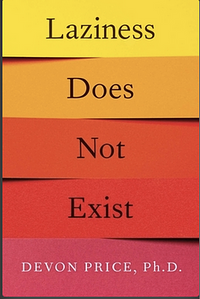Take a photo of a barcode or cover
informative
reflective
medium-paced
challenging
hopeful
informative
reflective
slow-paced
challenging
emotional
informative
inspiring
reflective
medium-paced
challenging
hopeful
informative
reflective
medium-paced
This was an excellent book on the ways we use the concept of laziness to the detriment of ourselves and others, ultimately failing to value or even consider the unknowns others are facing and our own needs and limitations. I would highly recommend this book to recovering people-pleasers, workaholics, and perfectionists like myself as well as anyone in education or other fields where viewing people as lazy can have extremely damaging impacts on how we treat others.
challenging
hopeful
informative
inspiring
reflective
slow-paced
informative
reflective
medium-paced
hopeful
informative
medium-paced
hopeful
informative
inspiring
reflective
fast-paced
informative
medium-paced
Reading the reviews on Goodreads for this book is pretty fascinating. The first I read talks about how the author does not go far enough in its revolutionary methods for the chronically ill and disabled. The next one claimed the book was dangerous for the radical messages around rest and encouraging people to turn to drugs and other “self-destructive indulgences”. These extremes are interesting because I thought this book was incredibly middle of the road. Maybe it’s a like a left-wing Rorschach?
For starters, I see this book as a self-improvement book; it’s clearly trying to give guidance and advice on how to step back from the demands of capitalism to see ourselves as the most valuable thing we take care of every day. It’s not a social history of class in the US, it’s not a thorough piece reporting out it’s own scientific research. I think maybe folks are coming in with different expectations. As a piece on self-improvement, I think this mostly works. It encourages healthy boundaries. I loved Price’s approach to activism. Many people criticize people who say they are too “burnt out” to be extremely politically involved; I think Price shows compassion for these people while giving them a path to restoring their passion in movements they care about.
I do agree with criticisms that a lot of the anecdotes and guidance seem most geared toward middle class people with desk jobs. Though the author doesn’t seem totally blind to the extra burdens race, class and health status place on the pressure to achieve. I think there isn’t a ton of focus on practical actions and how to build your life in such a way that you can step back from work without potentially dire consequences. But, like I said, this isn’t fully proposing a new framework for any particular system. Though it is critiquing many existing frameworks and asking us to consider how they grind our health down.
Overall, I just felt like this didn’t do as much for me as I wanted it to. I would suggest two companions to this piece depending on your preferred book type. For those who enjoyed the advice portions, the Nagoski sister’s Burnout discusses how the body responds to stress and how you can move through stress cycles. For those interested in the systems that underlie “the laziness lie”, I recommend Sarah Jaffe’s Work Won’t Love You Back. Jaffe’s book is one of the best on collective action I’ve ever read; it’s such an accessible history of how this country sustains it’s bad systems.
I 100% believe in the premise of the book, yet I will need someone to tell me over and over again. This glorification of productivity and overwork is not funny anymore and got into us too deep. We need to take care of ourselves and each other. Rest is not laziness. Laziness does not exist.






